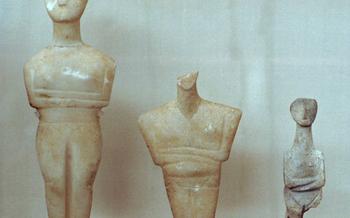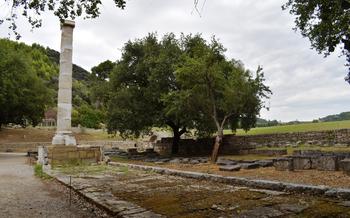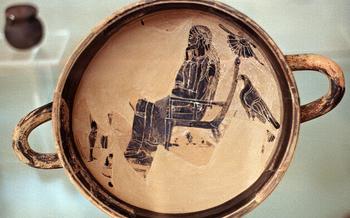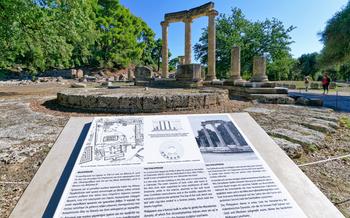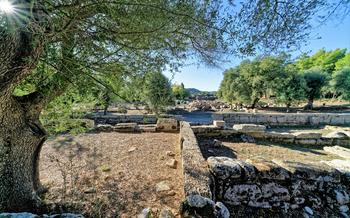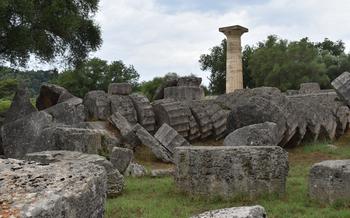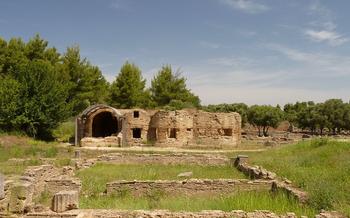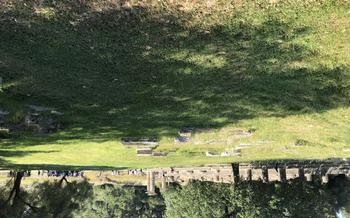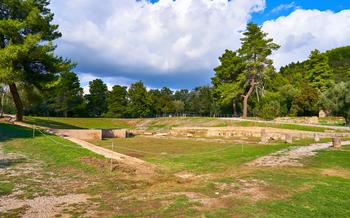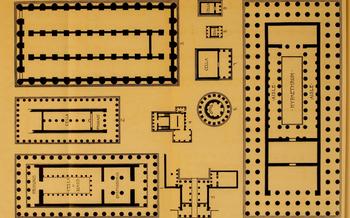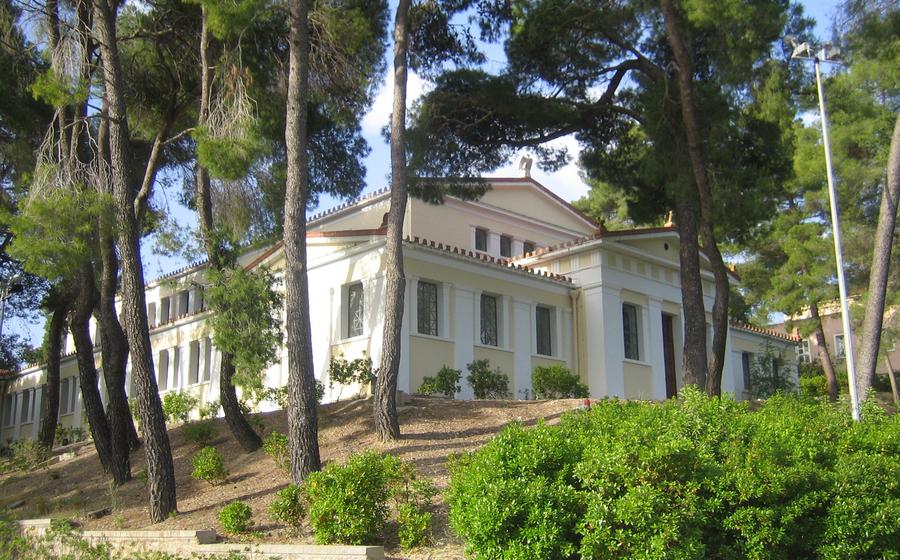
Museum of the Olympic Games
- Olympia: A Historical Overview
- The Museum of the Olympic Games
- Exploring the Museum's Collections
- Highlights of the Museum
- Interactive Exhibits and Displays
- The Ancient Stadium
- The Temple of Zeus
- Other Notable Sites in Olympia
- Planning Your Visit
- Transportation to Olympia
- Accommodation Options
- Food and Drink Recommendations
- Souvenir Shopping
- Cultural Events and Festivals
- Insider Tip: Unveiling Olympia's Hidden Treasures
Olympia: A Historical Overview
Olympia, nestled in the picturesque valley of Elis in the Peloponnese region of Greece, is a place of immense historical and cultural significance. Its fame stems from its role as the birthplace of the ancient Olympic Games, the most prestigious athletic and religious festival in the ancient world. The Games, held every four years, celebrated the glory of Zeus, the king of the gods, and showcased the athletic prowess of competitors from across the Hellenic world. Olympia's sanctuary, dedicated to Zeus, was considered one of the most sacred sites in Greece and attracted pilgrims, athletes, and dignitaries from far and wide.
Archaeological excavations conducted in Olympia have unearthed a wealth of ancient ruins, including temples, treasuries, statues, and athletic facilities, providing invaluable insights into the grandeur and significance of this ancient sanctuary. The discovery of these well-preserved remains has transformed Olympia into a living museum, offering a glimpse into the world of ancient Greece and the origins of the Olympic tradition that continues to inspire and fascinate us today.
The Museum of the Olympic Games
Located in the archaeological site of Olympia, the Museum of the Olympic Games is a must-visit destination for anyone interested in the history and legacy of the ancient Olympic Games. This state-of-the-art museum, inaugurated in 2004, is dedicated to preserving and showcasing the rich cultural heritage associated with the birthplace of the Olympic Games. Its unique collection of artifacts, sculptures, and inscriptions offers visitors an immersive journey into the world of ancient Greek athletics and the Olympic spirit. The museum's striking architectural design, featuring a series of interconnected galleries and courtyards, complements the surrounding archaeological site, creating a harmonious blend of history and modernity. As a cultural heritage site of global significance, the Museum of the Olympic Games stands as a testament to the enduring power of the Olympic ideals and the enduring fascination with the ancient Olympic Games.
Exploring the Museum's Collections
The Museum of the Olympic Games in Olympia houses a treasure trove of artifacts that provide a glimpse into the rich history and significance of the ancient Olympic Games. These artifacts, spanning various periods of Greek history, offer valuable insights into the athletic competitions, rituals, and cultural practices associated with this prestigious event.
Among the most notable artifacts are those related to the ancient Olympic competitions themselves. These include discuses, javelins, and other sporting equipment used by athletes in various events. Visitors can also admire the impressive collection of sculptures and statues depicting athletes in various poses, capturing the essence of their strength, agility, and determination.
Additionally, the museum houses a wealth of inscriptions and texts that shed light on the rules, regulations, and traditions of the ancient Olympic Games. These inscriptions provide valuable historical information about the event's organization, the participating athletes, and the significance of victory in the eyes of the ancient Greeks.
Highlights of the Museum
Among the most notable exhibits at the Museum of the Olympic Games are the statue of Hermes by Praxiteles, the discus thrower by Myron, and the Nike of Paionios.
The statue of Hermes, dating back to the 4th century BC, is a masterpiece of ancient Greek sculpture. It depicts the god Hermes carrying the infant Dionysus in his arms. The statue is made of Parian marble and stands at an impressive height of 12 meters. It is considered one of the most significant works of Praxiteles, known for his graceful and lifelike representations of the human form.
The discus thrower, also known as the Discobolus, is a bronze sculpture created by Myron in the 5th century BC. It captures the moment of an athlete poised to launch a discus. The statue showcases Myron's mastery of anatomy and movement, with the athlete's muscles tensed and his body contorted in a dynamic pose. It is considered one of the most influential sculptures of the ancient world and has been widely replicated and admired throughout history.
The Nike of Paionios, dating to the 5th century BC, is a marble statue depicting the goddess Nike, the personification of victory. The statue was originally part of a larger monument commemorating the victory of the Messenians over the Spartans. It portrays Nike standing on a globe, with her wings outstretched and her garments flowing gracefully. The statue is renowned for its elegance and the intricate details of Nike's drapery, which seem to capture the movement of the wind.
Interactive Exhibits and Displays
The Museum of the Olympic Games takes visitor engagement to the next level with its captivating interactive exhibits and displays. Immerse yourself in the thrill and glory of the ancient Olympic competitions through cutting-edge virtual reality experiences that transport you to the heart of the stadium. Witness the fierce competition and cheer on the athletes as if you were there 2,000 years ago.
Multimedia presentations bring the history and significance of the Olympic Games to life. Gaze upon captivating 3D models of the ancient stadium, unravel the stories behind iconic sculptures, and learn about the rituals and traditions that shaped these legendary events.
Interactive touchscreens offer an in-depth exploration of the museum's artifacts. Delve into the details of ancient Olympic sports, discover the techniques used by artisans to create breathtaking sculptures, and decipher ancient inscriptions that reveal the names and achievements of Olympic victors.
Don't miss the hands-on activities that allow you to experience Olympia's sporting legacy firsthand. Engage in a virtual discus throw, test your strength against ancient Olympic standards, and even try your hand at chariot racing. These interactive elements make learning about the Olympic Games a truly immersive and unforgettable experience.
The Ancient Stadium
Within the extensive grounds of the museum complex in Olympia lies the illustrious Ancient Stadium. This hallowed arena, imbued with profound historical significance, served as the epicenter of the ancient Olympic Games, where athletes from across ancient Greece congregated to showcase their prowess in various athletic disciplines.
Envision yourself transported back in time as you traverse this awe-inspiring stadium, the very ground upon which legendary athletes, their bodies honed to perfection, propelled themselves to victory, propelled by the fervent cheers of the spectators. As you gaze upon the immaculately preserved starting lines, you can almost perceive the palpable tension and anticipation that must have permeated the air as the competitors prepared to unleash their formidable skills.
Although the stadium has undergone extensive reconstruction efforts to restore its former glory, its venerable essence remains intact, whispering tales of athleticism, triumph, and the indomitable spirit of the ancient Greeks. Take a moment to absorb the sheer magnitude of this iconic venue, where history reverberates with each footstep.
The Temple of Zeus
The Temple of Zeus, one of the most iconic structures within the archaeological site of Olympia, stands as a testament to ancient Greek architectural prowess and religious devotion. Built in the 5th century BCE, it was dedicated to Zeus, the king of the gods, and served as a central location for religious ceremonies and offerings.
The temple's grandeur was evident in its colossal size, measuring approximately 64 meters in length, 27 meters in width, and 20 meters in height. Constructed from local limestone and adorned with intricate marble sculptures, it featured a double row of 38 Doric columns, each standing over 10 meters tall. The temple's pediments, or triangular gables, showcased elaborate sculptural compositions depicting mythological scenes, including the battle between the Centaurs and the Lapiths.
Inside the temple, a colossal statue of Zeus, crafted from ivory and gold by the renowned sculptor Phidias, once stood as one of the Seven Wonders of the Ancient World. Sadly, the statue did not survive the passage of time, but its fame and artistic significance continue to captivate imaginations.
The Temple of Zeus, despite its partial ruins, remains a symbol of ancient Greek religious architecture and a reminder of the deep devotion that the Greeks held for their deities. Its enduring presence invites visitors to step back in time and marvel at the grandeur that once defined one of the most sacred places in the ancient world.
Other Notable Sites in Olympia
In addition to the museum and the stadium, Olympia is also home to several other notable sites that offer a glimpse into the rich history and culture of the ancient Olympic Games.
- The Pelopion: This is a circular building that was built to honor Pelops, the mythical founder of the Olympic Games. It is thought to have housed a statue of Pelops, as well as other treasures and offerings.
- The Philippeion: This is a round temple that was built by King Philip II of Macedon, the father of Alexander the Great. It was dedicated to Zeus and the Muses, and it is one of the best-preserved monuments in Olympia.
- The Leonidaion: This is a large building that was built to house the athletes who were competing in the Olympic Games. It is named after Leonidas, the Spartan king who led the 300 Spartans at the Battle of Thermopylae.
Planning Your Visit
Make the most of your journey to Olympia by considering these essential details. The Museum of the Olympic Games typically welcomes visitors from 8 am to 8 pm daily, allowing ample time to explore its wonders. To fully immerse yourself, guided tours in various languages are available, providing insightful narratives. Additionally, audio guides are offered, offering flexibility and a personalized experience. Enhance your visit with these helpful resources.
Plan for a comprehensive experience by allocating at least two to three hours to explore the museum's diverse exhibits. Facilities on-site include a well-stocked gift shop, where you can find a range of souvenirs and educational materials. For your convenience, lockers are available to store your belongings while you delve into the ancient world. An on-site café offers refreshments, allowing you to recharge and savor the ambiance of the surroundings.
Transportation to Olympia
Olympia's archaeological site and museum are well-connected to major cities in Greece, ensuring a hassle-free journey for visitors. There are several transportation options available, catering to different preferences and budgets.
For those arriving by air, the nearest airport is Kalamata International Airport (KLX), situated about 87 kilometers from Olympia. From the airport, you can conveniently take a taxi or rent a car for a scenic drive to Olympia.
Alternatively, if you prefer to travel by land, Olympia is accessible by bus or train from Athens, the bustling capital of Greece. Buses depart regularly from Athens' central bus station, KTEL Kifissos, and the journey takes approximately five hours. Trains, on the other hand, offer a more comfortable and scenic option, with departures from Athens' Peloponnese Railway Station.
Once in Olympia, getting around is straightforward. The town is relatively compact, and the archaeological site and museum are within easy walking distance from most hotels and guesthouses. For those who prefer a more convenient option, taxis are readily available and affordable.
Accommodation Options
Olympia offers a range of accommodation options to suit every traveler's needs and budget. Whether you prefer the comfort of a luxurious hotel or the charm of a traditional guesthouse, there are plenty of places to choose from.
For those seeking a convenient and comfortable stay, the hotels near the museum and other attractions are an excellent choice. These hotels offer easy access to the main sights, as well as amenities such as swimming pools, fitness centers, and restaurants.
If you're looking for a more intimate and authentic experience, consider staying in a guesthouse. These small, family-run establishments offer a warm and welcoming atmosphere, along with the opportunity to interact with locals and learn about Greek culture.
To find the best deals on accommodation, it's advisable to book in advance, especially during the peak tourist season. Online booking platforms and travel agents can help you compare prices and find the best deals.
Here are some tips for finding the best accommodation in Olympia:
-
Consider your budget: Accommodation prices in Olympia can vary depending on the time of year, location, and amenities offered. Set a budget before you start your search to narrow down your options.
-
Location is key: If you want to be close to the museum and other attractions, choose a hotel or guesthouse in the city center. For a more tranquil experience, consider staying in one of the quieter neighborhoods on the outskirts of town.
-
Read reviews: Before booking your accommodation, read reviews from other travelers to get an idea of what to expect. This can help you avoid any unpleasant surprises and choose a place that suits your needs.
-
Book in advance: Especially during the peak tourist season, it's advisable to book your accommodation in advance to secure the best deals and avoid disappointment.
Food and Drink Recommendations
Olympia offers a delightful culinary experience, allowing you to savor authentic Greek flavors. Indulge in traditional dishes such as moussaka, a hearty casserole made with layers of eggplant, potatoes, and minced meat, topped with a creamy béchamel sauce. Sample the flavors of souvlaki, succulent grilled skewers of meat or vegetables, often served with pita bread, fresh tomatoes, and onions. Don't miss out on the local specialty, the famous "loukoumades," delicious bite-sized doughnuts drizzled with honey and cinnamon.
For a unique dining experience, choose a restaurant with a panoramic view of the ancient site. Enjoy a leisurely meal while admiring the iconic landmarks of Olympia, such as the Temple of Zeus or the ancient stadium. Savor the flavors of Greek cuisine as you soak in the breathtaking surroundings.
Souvenir Shopping
When it comes to souvenirs in Olympia, you can expect to find a treasure trove of unique handicrafts and mementos. Sports-themed memorabilia is a popular choice, with replicas of ancient Olympic medals and statuettes. You'll also find an array of handmade pottery, woven textiles, and leather goods adorned with traditional Greek motifs. For those seeking the authentic taste of Greece, there's no shortage of olive oil, honey, and spices to choose from. Be sure to visit local markets and boutiques to discover these treasures and support local artisans.
Cultural Events and Festivals
Olympia is not just about ancient history and archaeological wonders; it's also a vibrant cultural hub with a rich calendar of events and festivals. The city pays homage to its Olympic heritage with annual events like the Olympic Flame Lighting Ceremony, where the Olympic torch is lit before its journey to the host city of the modern Olympic Games. This awe-inspiring spectacle, steeped in tradition, attracts visitors from around the world.
Olympia also hosts local celebrations and festivals that showcase the region's unique traditions and folklore. The Olympia Festival is a two-week extravaganza featuring traditional music, dance, theater performances, and culinary delights. It's an immersion into the vibrant Greek culture, where locals and visitors come together to celebrate their heritage.
For those seeking a deeper cultural experience, the International Festival of Ancient Olympia offers a platform for artists and performers from around the world to showcase their talents inspired by ancient Greek culture. It's a melting pot of creativity, where contemporary interpretations blend seamlessly with the echoes of the past.
Attending these cultural events and festivals is a fantastic way to experience the living legacy of Olympia. They provide a glimpse into the soul of this ancient city, where history, tradition, and creativity intertwine to create a vibrant tapestry of cultural experiences.
Insider Tip: Unveiling Olympia's Hidden Treasures
For those seeking a tranquil escape from the crowds and a chance to immerse themselves in the true essence of Olympia, consider planning your visit during the shoulder seasons (April-May and September-October). During these periods, you'll encounter fewer tourists, allowing you to savor the ancient sites at your own pace and relish the serenity of the surroundings. Moreover, with fewer visitors, you'll have the privilege of engaging in more meaningful conversations with local experts and guides, unlocking hidden stories and gaining deeper insights into Olympia's rich history and traditions.
Venture beyond the renowned attractions and explore Olympia's hidden gems. Discover the tranquil Kladeos River, a picturesque spot for a leisurely stroll or a refreshing dip during the summer months. Unearth the ancient ruins of the Leonidaion, once a grand guesthouse that hosted prominent visitors and athletes during the Olympic Games. Delve into the intriguing history of the Pelopion, a sanctuary dedicated to the legendary hero Pelops, believed to be the founder of the Olympic Games. By exploring these lesser-known sites, you'll gain a comprehensive understanding of Olympia's multifaceted past and leave with a profound appreciation for its enduring legacy.
